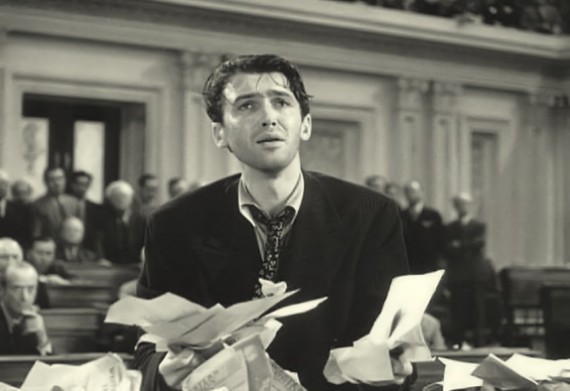Can Senate Democrats Eliminate The Filibuster? Should They?
With Democrats set to maintain their majority in the Senate, some on the left are pushing for filibuster reform. However, it seems unlikely that Harry Reid has the votes to change a long-standing Senate rule.
At The American Prospect, Tim Fernholz argues that Senate Democrats should take advantage of the fact that they still control the Senate to take a run at eliminating the filibuster:
The Progressive Change Campaign Committee has a new poll showing that 64 percent of voters oppose the filibuster. While it strikes me as one of those polls that miraculously finds what the client wants it to find, it does seem clear that the beginning of the 112th Congress in January would be a great time for Vice President Joe Biden to head down to the Capitol for the inaugural session and rule filibusters unconstitutional, with the Democratic caucus voting to uphold the ruling.
The method by which this would happen would be the so-called “nuclear” or “constitutional” option (the name depending upon which side of the debate one happens to be on at a give time), which Ezra Klein wrote about several months ago:
The constitutional option gets its name from Article I, Section V of the Constitution, which states that “Each House may determine the Rules of its Proceedings.” In order to fulfill this constitutional order, the Senate must be able to, well, determine its rules. A filibuster, technically, is a way to stop the Senate from determining something by refusing to allow it to move to a vote. Because stopping the Senate from considering its own rules would be unconstitutional, the chair can rule against the filibuster, and the Senate could then move to change its rules on a majority vote.
One caveat: Many people, including Udall himself, believe this has to happen at the beginning of a new Congress. If it doesn’t happen at the beginning of a new Congress, then Congress is considered to have acquiesced to the previous Congress’s rules, and a filibuster against further rule changes wouldn’t interrupt the constitutional right to determine the rules.
Theoretically, then, all one would need is a ruling from Vice-President Biden, acting in his role as President of the Senate, that the current Senate rule forbidding the filibuster rule from being revised without the support of 67 members is unconstitutional, and the Democratic majority could eliminate, or significantly revise, the filibuster rules. There wouldn’t be any avenue for appealing the decision as the Federal Courts have generally declined to intervene in the right of Congress to establish its own procedural rules.
The question, then, is whether Senate Democrats should make the effort to eliminate the rule, and Fernholz believes that the benefits are obvious:
There’s any number of good reasons to do this. Eliminating the filibuster, or instituting some kind of semi-elimination compromise, is good policy generally, and nominally supported by the administration and a number of Democratic senators. This would be a fairly effective strategy to regain the party’s initiative and display its unity. It will be harder for Republicans to paint this as a power grab, since they’re the ones who gained in this election.
Of course, the advantage for Democrats is that they will be able to have more control of the one chamber where they possess a majority, making it easier to pass their own priorities — rather than have the House pass a lot of bills and the Senate take no action, you could see a dynamic where the Senate and the House pass a lot of competing versions of bills, creating both more contrast between the parties and making the possibility of actual legislation more likely.
The other side of the coin, of course, is that the filibuster rule has withstood previous challenges because both the majority and the minority recognize that the tables can turn very easily, and that they may want to use the procedural tools they now complain about when they are in the minority. Senate Democrats seemed to recognize that reality back in July when it became clear that they lacked the votes to eliminate the filibuster even with a caucus of 59 members:
“It won’t happen,” said Sen. Dianne Feinstein (D-Calif.), who said she would “probably not” support an effort to lower the number of votes needed to cut off filibusters from 60 to 55 or lower.
Sen. Daniel Akaka (D-Hawaii) echoed Feinstein: “I think we should retain the same policies that we have instead of lowering it.
“I think it has been working,” he said.Sen. Mark Pryor (D-Ark.) said he recognizes his colleagues are frustrated over the failure to pass measures such as the Disclose Act, campaign legislation that fell three votes short of overcoming a Republican filibuster Tuesday.
“I think as torturous as this place can be, the cloture rule and the filibuster is important to protect the rights of the minority,” he said. “My inclination is no.”
Sen. Jon Tester, a freshman Democrat from Montana, disagrees with some of his classmates from more liberal states.
“I think the bigger problem is getting people to work together,” he said. “It’s been 60 for a long, long time. I think we need to look to ourselves more than changing the rules.”
Sen. Ben Nelson (D-Neb.), who is up for reelection in 2012, also said he would like the votes needed for cloture to remain the same.
“I’m not one who think it needs to be changed,” he said.
That’s four votes in the Democratic caucus against eliminating the filibuster right there and, considering that the new Senate is going to have a 53-47 split, that means that there would not be majority support for changing the filibuster rule. So, it’s not going to happen.
As I’ve said before, I don’t necessarily consider the filibuster a bad thing even though it does seem to have become much more common in recent years. However, I think Kevin Drum’s suggestion for this one minor reform has merit:
what about something narrower? The least defensible use of the filibuster is against executive branch appointments, and I wonder if Republicans couldn’t be talked into supporting a change here? Maybe something that does away with the filibuster but puts in place some specific and limited ways that executive branch appointments can be delayed instead. This runs up against the hideous (and bipartisan) ego-driven nature of the Senate, where every member prizes their ability to hold up appointments in order to extort favors of one kind of another from the White House, but still — you never know. With only two years left in Obama’s term and Republicans feeling like history is on their side, it’s not completely out of the question.
Not completely, but it’s still not likely for the reasons that Drum stated. Nonetheless, it strikes me as a good idea from a policy point of view. Whatever one thinks of the filibuster, it strikes me that there is a fundamental difference between using it to block a piece of legislation and using it to block a judicial nominee who otherwise would be approved by a majority of the Senate. If we had a rational political system, we might be able to do something to fix that. Unfortunately, we live in anything but rational times.







They will bluster and in the end do nothing because they know in 2012 it is likely that they will lose control. This is just sauce for the moonbats.
Filibuster reform will only ever occur if the minority party pushes for it. And both parties only ever seem to care about it when they’re the majority party.
The one filibuster reform that I would get behind is the requirement that the minority ACTUALLY filibuster, i.e. stand up there and talk non-stop for 72 hours or however long it takes. Maybe they’ll be less likely to use it if we take away the ability for one senator to say “I’m filibustering”, and then everyone just goes home.
What Ben said.
Yup, agree with Ben. If they don’t believe in it enough to do that, then their objection is just playing obstructionalist politics.
What Ben said.
I do not think appointments to court or other positions in government should be subject to the fillibuster and I would like to see it limited-more to an old style kind where the filibusterers have to actually control the floor and stay up all night if necessary.
I do think there is a place for the filibuster in legislation. I just think we are at a point where it is too easy to invoke without much cost to those enacting the filibuster in time or effort. If they have to put more effort into it, I think they will choose more carefully what bills to filibuster.
But I am not really a fan of the nuclear option-if the rule for filibuster is changed I think it should be changed to prohibit filibusters on anything other than legislation.
Hahahahahaha…Democrat and Republican politicians, not a dime’s worth of difference. Both are power grubbing turds we’d all likely be better off without.
If horses could fly….